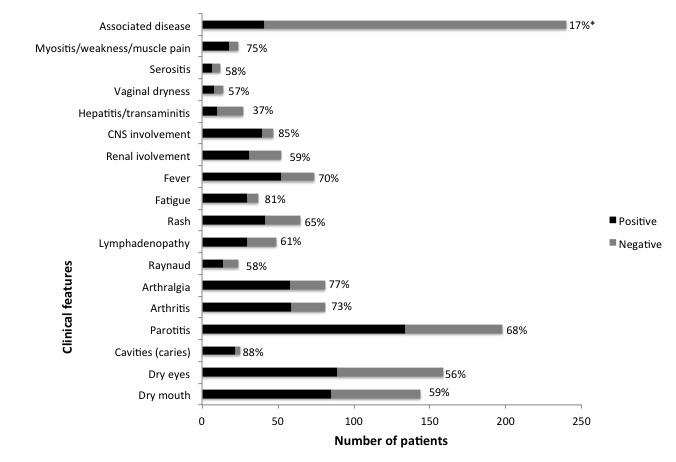Session Information
Date: Sunday, November 8, 2020
Title: Sjögren’s Syndrome Poster
Session Type: Poster Session C
Session Time: 9:00AM-11:00AM
Background/Purpose: Sjogren’s syndrome (SS) is an autoimmune chronic disease characterized by inflammation of exocrine glands, but it can affect other organs as well.This study aims to describe childhood SS (cSS) features by reviewing pediatric published cases with individual data.
Methods: We conducted a literature review of cSS (age < 18 years). Eligible papers were identified through a Medline search of English language articles published in the PubMed database until February 2020. Statistical analysis was performed to detect associations between clinical/laboratory features.
Results: Two-hundred-forty patients were identified (191 female); the median age at disease onset was 10 years (range3 months-17 years). Main clinical features are shown in Figure 1. The most frequently reported clinical SS-specific feature was parotitis (134/198 patients; bilateral:unilateral=2.5:1); fewer patients had sicca symptoms (89/159 with dry eyes; 85/144 with dry mouth). Arthritis was the most frequent extraglandular manifestation. Renal tubular acidosis represented the typical expression of renal involvement (19 cases). Neuromyelitis optica and aseptic meningoencephalitis (6 and 9 cases, respectively) were the most typical neurologic manifestations. Two cases of interstitial lung disease and one of pulmonary hypertension were reported. Investigations are shown in Figure 2. Almost all patients had autoantibodies, mostly ANA (200/224 patients) and anti- SSA/Ro (170/208 patients). The Schirmer test was performed in less than half of the patients, of whom 62% tested positive. A positive result of minor salivary biopsy was reported in 129/140 cases with available data. Juvenile idiopathic arthritis was the most frequently associated disease, followed by systemic lupus erythematosus (16 and 8 cases, respectively). No significant differences between patients with or without parotitis were found except that patients with parotitis showed increased levels of CRP more frequently than those without it (p= 0.00). Patients with anti-SSA/Ro had more frequently a positive Schirmer test (p= 0.04). The presence of RF was significantly associated with dry mouth (p= 0.00), arthritis (p= 0.00), and rash (p= 0.04). A positive minor salivary biopsy was more common in children with dry eyes than in those without this clinical feature (p= 0.02). Arthritis was more frequent in patients with other diseases than in those with primary SS (p= 0.00). We further investigated SS features according to the age groups (≤ 6 years, 7-11 years, ≥ 12 years). Parotid involvement was inversely proportional to the age and occurred more frequently in younger patients (79% of those ≤ 6 years; p= 0.03). Interestingly, the rate of anti-SSA/Ro positivity increased with age (97% of those ≥ 12 years; p= 0.00).
Conclusion: Even though parotitis was the most frequently reported feature, a wide range of clinical manifestations in children with SS has been reported so far. A better knowledge of cSS features will help to pave the way for the development of cSS specific diagnostic criteria.
 Figure 1. Main clinical features. *Values are the number of patients with positive findings/patients with available information (%). CNS: central nervous system
Figure 1. Main clinical features. *Values are the number of patients with positive findings/patients with available information (%). CNS: central nervous system
 Figure 2. Investigations. *Values are the number of patients with positive findings/patients with available information (%). CRP :C-reactive protein; ESR: erythrocyte sedimentation rate; RF: rheumatoid factor; ANA: antinuclear antibodies; Opthalm test: Ophthalmological test (Schirmer test or Rose Bengal staining); MSG biopsy: minor salivary gland biopsy.Imaging: parotid ultrasound or computed tomography, sialogram, scintigraphy
Figure 2. Investigations. *Values are the number of patients with positive findings/patients with available information (%). CRP :C-reactive protein; ESR: erythrocyte sedimentation rate; RF: rheumatoid factor; ANA: antinuclear antibodies; Opthalm test: Ophthalmological test (Schirmer test or Rose Bengal staining); MSG biopsy: minor salivary gland biopsy.Imaging: parotid ultrasound or computed tomography, sialogram, scintigraphy
To cite this abstract in AMA style:
Marino A, Romano M, Giani T, Gaggiano C, Costi S, Singh R, Mehta J, Lieberman S, Cimaz R. Features of Childhood Sjogren’s Syndrome: A Literature Review Based Cohort [abstract]. Arthritis Rheumatol. 2020; 72 (suppl 10). https://acrabstracts.org/abstract/features-of-childhood-sjogrens-syndrome-a-literature-review-based-cohort/. Accessed .« Back to ACR Convergence 2020
ACR Meeting Abstracts - https://acrabstracts.org/abstract/features-of-childhood-sjogrens-syndrome-a-literature-review-based-cohort/
